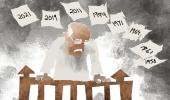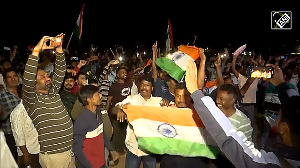The Chief Justice of India, Justice N V Ramana Saturday said the Legislature needs to revisit laws and reform them to suit the needs of time and people so that they match 'practical realities'.

The CJI while inaugurating the new building of the Odisha State Legal Service Authority in Cuttack, also said there is need for the executive and the legislature to work hand in hand in realising 'constitutional aspirations'.
"I emphasise, our laws must match with our practical realities. The executive has to match these efforts by way of simplifying the corresponding rules," Justice Ramana said.
He also emphasised that it was important for the Executive and Legislature to 'function in unison in realising Constitutional aspirations'.
The CJI noted that it is only then, the Judiciary would not be compelled to step in as a law-maker and would only be left with the duty of applying and interpreting laws.
At the end of the day, it is the harmonious functioning of the three organs of the State that can remove procedural barriers to justice, he pointed out.
Stating that the Indian Judicial system is faced with twin challenges, the CJI pointed out that the first one is that of 'Indianisation of Justice delivery system'.
Even after 74 years of Independence, traditional and agrarian societies which have been following customary ways of life, 'feel hesitant to approach the courts', he noted.
'The practices, procedures, language of our Courts feel alien to them,' he said adding that between the complex language of the acts and the process of justice delivery, the common man seems to lose control over the fate of his grievance.
Often in this trajectory, the justice-seeker feels like an outsider to the system, he pointed out.
He added that often the Indian legal system fails to take into consideration the social realities and implications.
'Sadly, our system is designed in such a way that by the time all the facts and law are churned in the court of law, much gets lost. People might be bringing their problems to the courts, but what remains at the end of a day is yet another 'case',' the CJI said.
He said the concept of 'Access to Justice in India' is much broader than simply providing lawyers for representing an accused before the courts.
In India, he said, the task to facilitate access to justice to the poor and marginalized has been conferred upon legal services institutions such as OSLSA, whose activities include increasing legal awareness and legal literacy amongst classes who have traditionally remained outside the purview of our system.
'Be it a matter of compensation or eviction or a customary issue of marriage and inheritance, a common man needs a faster remedy,' he said.
The CJI said the legal services authorities have a great responsibility to boost the alternative dispute resolution (ADR) mechanisms such as Lok Adalat, mediations, and conciliations, so as to render justice, which is more inclusive, participatory, and 'definitely faster'.
'If we want to retain the faith of our people, we need to strengthen not only the judicial infrastructure, but we also need to boost our outreach programs as well,' the CJI said.
Considering the gravity of the challenge, 'we have decided to launch a country-wide robust legal awareness mission in the upcoming week. I expect your cooperation and support to take this effort into the remotest corner', he said.











 © 2025
© 2025